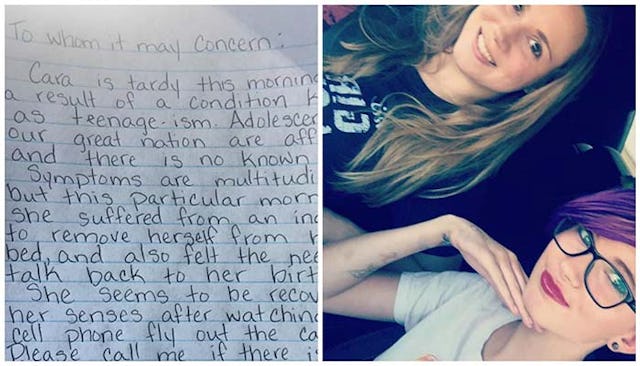Mom Blames Teen's Lateness On 'Teenage-ism' And Parents Everywhere Relate

California mom’s note about teen daughter’s lateness goes viral
It was just a typical school morning for mom Nicole Poppic and her three kids, ages 14, 10, and 4 — Cara, her eldest, was running late and holding up the rest of the family. Anyone who has ever been a teenager…and we’re going to say that’s most of us…or who is the parent of a teenager, is familiar with this scene. The sun in its’ blazing audacity rises again, and those whose age ends in “teen” fight to stay in bed, ignoring the protests and demands of their parents who are trying to throw them to the mercy of a day that is sure to suck.
On this particular morning, however, a fed-up Poppic wrote a note to her daughter’s school explaining that her lateness was due to “teenage-ism.” The internet is exhausted from its’ three-day standing ovation.
To whom it may concern: Cara is tardy this morning as a result of a condition known as teenage-ism. Adolescents across our great nation are afflicted, and there is no known cure.
As Poppic explains in her blog, this was just one of those mornings that every parent has, where it starts out aggravating and then, in a blinding flash, becomes the carrier of all the rage you have ever felt in your entire life. Poppic describes how she was giving Cara the usual mom lecture about lateness and responsibility in the car on the way to school, when she heard music coming from the backseat. “That is when I saw that she had put in her headphones and was staring out her window, completely ignoring me.” That. Right there. That’s the moment everything burst into flames. Poppic grabbed her daughter’s phone, unplugged her headphones, and threw the phone out the car window.
She threw the phone. Out the window.
My favorite part of this is the fact that she unplugged the headphones first. Somewhere inside her, underneath the fury, was a voice of reason that I like to think sounds like Neil Degrasse Tyson saying, “Unplug the headphones. They will create air resistance which will only slow the speed of the projectile.” Thanks, Science!
Symptoms are multitudinous, but this particular morning she suffered from an inability to remove herself from her bed and also felt the need to talk back to her birth-giver.
When they finally got to school and her daughter needed a note to excuse her lateness, Poppic decided, as many of us would, that hell no she wasn’t going to excuse this lateness. Instead, she wrote a note explaining that Cara was late due to a flare up of “teenage-ism,” the symptoms of which include the inability to get out of bed and “talking back to her birth-giver.”
Now, it’s important to note that Poppic did retrieve her daughter’s phone from a neighbor’s front lawn and kept it for four days as a punishment, and Poppic has made clear that her daughter is not a bad kid, she was just a teen having a teen day: “I don’t want anyone under the false impression that Cara is a bad kid. She is an honor roll student and an extremely talented piano player who can play anything after she hears it a few times. I am very proud of her and I love being her mom. She was just having a bad morning.”
She seems to be recovering her senses after watching her cell phone fly out the car window. Please call me if there is another flare-up.
We have no doubt, nor should anyone, that Cara is a great kid and her mom loves her. Again, all of us have been teenagers and we all know how horrible we were. Conflict and attitude are just part of growing up and starting to separate yourself from your parents by making them hate you. (Kidding. A little.) And Poppic was trying to teach her daughter an important lesson. As she put it so well in her blog: “I feel it is important for all of my children to realize that no matter what kind of mood a person is in, they are still responsible for their own actions and they are expected to be aware of how those actions affect other people.”
PREACH.
For every parent that has been in Poppic’s shoes, her note was a welcome laugh at the drama that is raising a teenager.
This article was originally published on